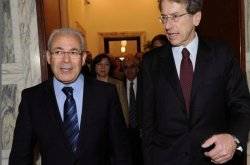The splintered opposition Syrian National Council has re-elected liberal Burhan Ghalioun as president, two sources at the meeting say.
Tuesday's decision to give him a three-month extension is apparently aimed at building his reputation as a consensus-builder with some international support.
Ghalioun, a 67-year-old secular academic, has led the opposition in exile since the SNC's creation in August 2011.
Some fellow activists have accused him of being out of touch with dissidents inside Syria and of failing to unify the movement.
Infighting and a lack of political coherence within the SNC have made it struggle to win formal international recognition as the sole legitimate representative of the anti-Assad movement.
However, Ghalioun enjoys the backing of the Gulf Arab states and France, and is seen as a consensus figure in a group where Islamists, divided into different factions, hold sway.
Aware that he is an acceptable figure to the international community, the Islamists opted to support him.
"Ghalioun was re-elected for another three-month term," one of the sources told Reuters news agency after the meeting in Rome of the council's general secretariat, which chooses the president every three months.
"He won 66 per cent of the vote."
French connection
Ghalioun, a leftist who has been living in Paris for decades while making regular trips to his homeland, is also well connected with the Socialist Party of new French President Francois Hollande.
He was dismissed initially by political rivals as an aloof peacenik unsuited to steer a popular uprising against Syrian President Bashar al-Assad that is turning more to armed struggle.
But Ghalioun's allies say he has emerged as his own man, establishing alliances with different groups within the council and links with Western and Gulf governments.
A Kurdish bloc within the council, which had resigned, returned to the body last month after reaching a compromise with Ghalioun on support for Kurdish rights.
When sectarian killings between Assad's minority Alawite sect, an offshoot of Shia Islam, and Syria's majority Sunni Muslims erupted in Homs last year, Ghalioun condemned the slaughter and warned rebels not to participate in a bloodbath he said would badly damage the uprising.
However, as the uprising against Assad has become more militarized, Ghalioun has increasingly swung behind the idea of armed revolt.
"We are trying more and more to take political control or supervision of the rebels and reorganize them so we can create a new political strategy," Ghalioun told Reuters before his re-election at the meeting in central Rome.
The meeting was hosted by the Italian government to bolster efforts to unify the Syrian opposition.
Runner-up
George Sabra, another liberal who is an ally of Syria's top dissident Riad al-Turk, came second in the ballot.
Turk, an 81-year-old former leftist who spent 25 years as a political prisoner, operates underground inside Syria. The opposition looks to him for moral guidance.
Sabra confirmed that Ghalioun was re-elected, but he said other issues such as strengthening internal structure and improving communication with opposition groups inside Syria were still unresolved.
"We didn't finish everything unfortunately."
Ghalioun's supporters acknowledge that his leadership style is too individualistic and say he needs to delegate, especially in the foreign affairs portfolio, and help the SNC function as an organization that encompasses different currents but is united around the goal of bringing down Assad.
"We agreed in our meetings that the role of the General Secretariat needs to be activated and that Ghalioun cannot remain the point man for everything," SNC member Anas al-Abdeh, whose Damascus Declaration bloc voted for Sabra, said.
PHOTO CAPTION
Ghalioun, a secular academic, has led the opposition in exile since the SNC's creation in August 2011 [EPA]
Aljazeera


 Home
Home Discover Islam
Discover Islam Quran Recitations
Quran Recitations Lectures
Lectures
 Fatwa
Fatwa Articles
Articles Fiqh
Fiqh E-Books
E-Books Boys & Girls
Boys & Girls  Articles
Articles










